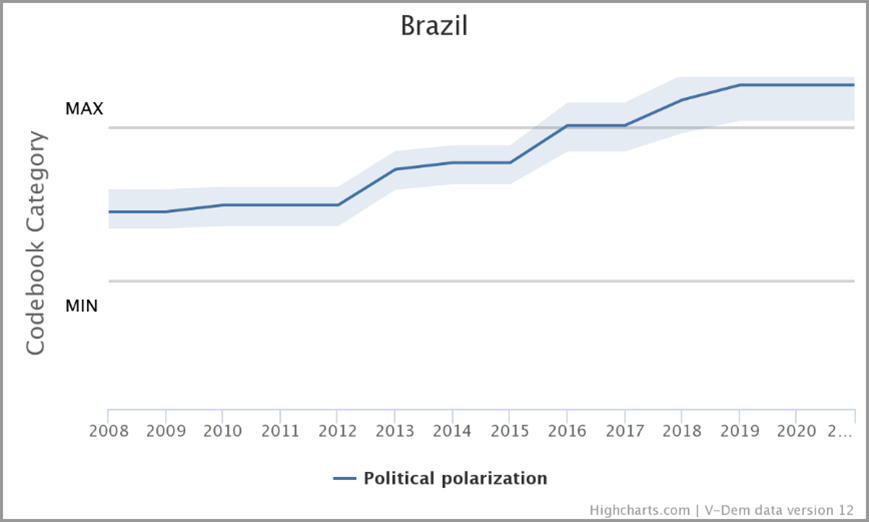Brazil faces the most important elections in its history. Jair Bolsonaro is seeking re-election, while Lula da Silva is seeking to return to the presidency. A duel between the extreme right and the pragmatic left will decide the future of the country.
Since 2012, Brazil has experienced a process of political turmoil marked by increasing polarization in the country. Since Dilma Rousseff’s impeachment in 2016, polarization has reached historic levels that explain Jair Bolsonaro’s rise to power in 2018. The change from a Workers’ Party (PT) government to a far-right government demonstrates the political changes in the country.
The polarized context does not allow an easy terrain for any of the candidates. Bolsonaro has the resources and capabilities as president that can help him in the polls, yet he faces a disapproval rate of close to 56%. His campaign promises were based on economic recovery, but his administration did not meet the desired goals, partly because of mismanagement and because of COVID-19. In the face of the pandemic, it is the country with the second-highest number of deaths from the coronavirus, after the USA. The 666,000 deaths have earned it the name “Brazilian tragedy” in the region.
Bolsonaro’s handling of the crisis was one of denialism and confrontation with scientists, which has had a very high political cost. Now, months before the elections, Brazil is experiencing inflation, an economic slowdown, and an alarming increase in poverty. These are likely to be the most relevant issues of the presidential campaign, and they are a sample of the context of 20 years ago when Lula came to power.
Brazil’s depolarization process in the 1990s and early 2000s was marked by two people, Fernando Cardoso (president from 1995-2002) and Lula (president from 2003-2011). Both from different political spectrums, during Cardoso’s presidency Lula and the PT were already carrying out actions that reduced polarization and prepared the political system for left-wing government. What could be called a constructive opposition, where there were conversations, coordination, and cooperation between the Cardoso government and the PT. By 2002, the economic transformation in Brazil had been consolidated, which gave way to the social transformation in the Lula government. It should be noted that without Cardoso’s economic management, Lula’s administration would have been completely different, and that is one of the main changes for this year’s elections.
Constructive opposition has proved considerably difficult with a government like Bolsonaro’s, which frequently resorts to attacks and violent language against perceived opponents. Moreover, on the side of Lula and the PT, the last few years have not only been recognized for their work as regional administrators and responsible opponents. The PT has been embroiled in numerous scandals of corruption, clientelism, and misrule so since the impeachment of Dilma (a PT member) one could speak of a party crisis. For his part, Lula was at the epicenter of political debates because of his case of passive corruption (not corruption actions, but negligence about the issue) during his government, which further divided the population. Judge Sergio Moro, who sent Lula to jail, was later Bolsonaro’s justice minister, and until two months ago, he was the third presidential candidate with the highest voting intentions. The incursion from a judge to a member of the government, and candidate reflects the polarization and the affectation of institutions in Brazil.
With Lula being a polarizing factor due to the corruption condemnation and the polemic trial, rather than a diminishing factor in the time leading up to the election, it is difficult to know whether he will still have the political capacity to “depolarize” the country when he takes office. Brazil in 2022 does not have the same economic capacities it had in 2002, so its flagship policy of poverty reduction and social care will not be easy to implement. Moreover, political capacity has also changed. The PT has eroded its political capital over the last decades and “Bolsonarism” seems rather difficult to persuade. Therefore, the answer seems to lie in what was known as the “coalition government” with which the PT governed since the 2000s. This current of governance is a completely pragmatic one that allows for the inclusion of all possible sectors of Brazilian politics. In fact, during the campaign, Lula has already made alliances and coalitions with political sectors that were once political enemies. This pragmatism in governance during electoral campaigns could be the key to the victory of the former PT president, and also the best opportunity to attack the country’s polarization.
What will be the results of the elections? There is no way of knowing at the moment. Is there a possibility of depolarization after the election? We can say that it depends on the winner. Bolsonaro, as he has already shown in his government, does not show any will for political inclusion. Lula, on the other hand, could do so, but he will no longer have the resources for his social policies that were the basis for depolarization in the 2000s through the economic development. Perhaps cooperation with other potential leftist leaders in the region could be the innovative means to unite the Brazilian population.
Conexión Global Prime. (2022). Colombia y Brasil: Elecciones claves en 2022 para política de América Latina. CNN Chile. https://www.youtube.com/watch?v=jplH74KbBk4
DW Español. (2022). Sergio Moro abandona su candidatura a las elecciones presidenciales de Brasil. DW. https://www.youtube.com/watch?v=88oWwRIr5mQ
Timothy Power. (2016). The reduction of Poverty and Inequality in Brazil, political causes, and political consequences. Chapter 9. Ben Ross Schneider. New Order and Progress, Development and Democracy in Brazil. Oxford University Press, 2016.
Todo Noticias. (2022). ELECCIONES BRASIL 2022: ¿VULVE LULA? El candidato que más crece en las encuestas. TN Internacional. https://www.youtube.com/watch?v=AMB6VKCsse8

V-Dem. (2022). Political Polarization in Brazil.

0 Comments